
Saturday Seven is hosted by Long and Short Reviews.
I had mixed feelings about history class when I was in school. The chapters about war and the military honestly bored me to death. Kudos to those of you who like reading about battles and peace treaties, but I have not spent a single moment thinking about any of that stuff since I graduated from college.
On the other hand, the chapters that even briefly mentioned the lives of ordinary people interested me quite a bit. Today I’ll be talking about some of the many books I’ve read that chronicled the experiences of regular folks.
If you have any suggestions for me of other books to read, I’d love to hear them! I know I’m barely scratching the surface of this topic today.
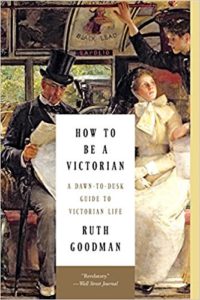
How to Be a Victorian by Ruth Goodman.
How did Victorians wash their hair, cook, clean, take care of sick relatives, and raise children? This book went into vivid detail about the daily lives of people in this era. The best part of it was that the author tried many of the things she was writing about, so she was able to give a highly personalized account of what it was actually like to live this way. The section that talked about how dangerous it could be to wash clothing back in the day was one of my favourites. I had no idea how easy it was to lose a finger doing that!
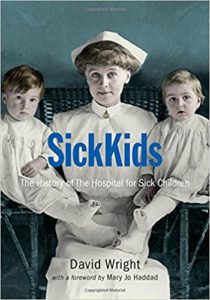
Sick Kids: The History of the Hospital for Sick Children by David Wright
For any of my readers who haven’t heard of it, Sick Kids is a renowned children’s hospital here in Toronto. Why am I mentioning such a well-known institution in today’s post? Well, it began as a tiny charity solely run by volunteers in a small, rented house. The handful of children they cared for in the beginning were poor and had no other way to receive the vital medical care they needed. All of the supplies and treatments the children required were donated, too.
While I read the first few chapters, I was in awe of how much good work can be done by completely average people.
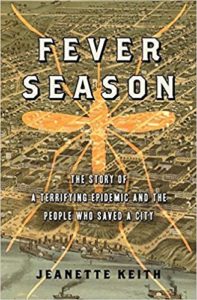
Fever Season: The Story of a Terrifying Epidemic and the People Who Saved a City by Jeanette Keith
Yellow Fever is a horrendous disease. When it struck Memphis, Tennessee, in 1878, some of the pillars of the community fled to safety before they caught this illness. Of the twenty thousand people who remained, seventeen thousand of them became sick. Five thousand people died during this epidemic. Can you imagine digging that many graves or comforting that many grieving loved ones? I sure can’t.
The prostitutes, poor people, and other volunteers who stuck around to take care of the sick and bury the dead were heroes. Some of them died as a result of their decision to take care of those who couldn’t look after themselves. I only wish more history books talked about stories like this one.
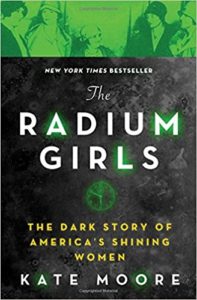
The Radium Girls: The Dark Story of America’s Shining Women by Kate Moore
A hundred years ago, many people had no idea how dangerous radium was. Those who did know it could be deadly worked tirelessly to keep this information hidden from the public. Hundreds of young, working class women who had few other options in life were hired to paint radium dials on watches without any idea of just how dangerous their job was or how much they were permanently damaging their health.
I should warn you that this book contains graphic descriptions of what happens to someone’s body after they’ve received a toxic dose of radiation. Many of these women died gruesome deaths, and others suffered debilitating health problems for the rest of their lives.
Their deaths and permanent disabilities did serve a purpose, however. Some of the strict safety rules that companies that use hazardous materials are required to follow today are a result of the lawsuit these women participated in once they realized that their employers had lied to them about how safe their jobs truly were.
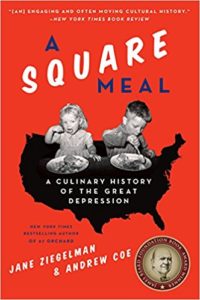
A Square Meal: A Culinary History of the Great Depression by Jane Ziegelman
Three of my grandparents grew up during the Great Depression, and the fourth was born during World War II when foods like meat, wheat, butter, and eggs were strictly rationed. One of my grandparents was so malnourished early in life that he actually wasn’t expected to survive.
They have rarely spoken about that time in their lives to me, but I thought of the uncertainties of their early childhoods as I read this book. Many of the food-based social programs like free school lunches that exist today were started in order to prevent the deaths and permanent disabilities that happen when people don’t have enough nutritious food to eat.
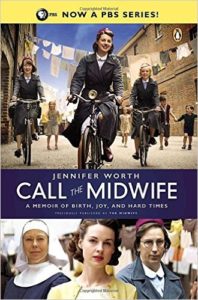
Call the Midwife: A Memoir of Birth, Joy and Hard Times by Jennifer Worth
Jennifer Worth grew up in a comfortable, loving, middle class family. She really had no idea what she was getting into when she decided to work as a midwife in a desperately poor part of London called the East End. The contraceptive pill and other forms of reliable birth control didn’t exist back then, so women were constantly getting pregnant regardless of whether or not they actually wanted or could afford to care for another child.
When you mix this in with the grinding poverty and crime of this era, you can imagine just how heartbreaking some of the stories about her clients were. One of the most memorable ones was about a young, heavily pregnant, developmentally-delayed girl Jennifer cared for who knew virtually nothing about sex or reproduction. Imagine trying to explain pregnancy and childbirth to someone who didn’t understand those concepts but who was going to have to give birth soon!
If you haven’t seen the British television TV based on this series yet, I highly recommend checking it out. The first few seasons that were based on Jennifer’s true-life experiences were excellent.
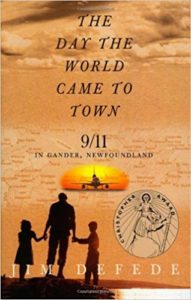
The Day the World Came to Town: 9/11 in Gander, Newfoundland by Jim Defede.
Does 9/11 count as history yet? I can’t believe it’s been almost seventeen years since the dreadful events of that day. Based on the fact that there’s a memorial museum for the victims of that attack now and some movies have been made about it, I’m going to count it as the final entry on today’s list.
Thirty-eight jetliners that had been flying towards the United States were forced to land in Gander, Newfoundland after the terrorist attack. You should know that Gander is a very small town that doesn’t have any of the usual amenities like large hotels to accommodate so many visitors.
Instead, the private citizens of Gander opened up their own homes and schools to all of the stranded travellers so that everyone would have a safe place to stay. They did everything from cook meals for these strangers, to invite them over to have a shower, to empty out their linen closets so that everyone would have a blanket to stay warm and a towel to dry off with. The animals who had been traveling in the cargo section were treated well, too.
When it was all over, the generous people who lived in Gander refused to take any payments for all of the work they’d done because they believed that Americans would have done exactly the same thing for them if their positions had been reversed. There was so much kindness and empathy in this story. I really hope it becomes a movie someday.
Do you like to read books about history? If so, what ones do you enjoy?

I adore history books that are well written, or fictional books that include historically accurate history. I read John Jakes’ American Revolution (and beyond) series (The Bastard, The Rebels, The Seekers, etc) in high school, and I swear they helped me pass history. I think if you can become invested in a character, you remember the story. The John Adams mini series on HBO did the same thing. Good list!
Thank you. I’m going to try to find copies of American Revolution and the John Adams miniseries. They both sound pretty good.
Lydia, I loved that you gave us an abstract for each book. Really gives us a chance to see what it’s about.
And thanks for coming to visit me already this morning!
My Saturday Seven is here: http://www.ourtownbookreviews.com/
You’re welcome, Kathy!
WOw! Those are actually some COOL sounding history books! Thanks for the share.
I’m not normally one to read nonfiction, but some of these are definitely going on my TBR list! Thanks for doing such a great job talking about them! My post is here: http://jhthomas.blogspot.com/2018/03/saturday-seven-dreams-of-reading-nooks.html
Thank you. I’m glad to hear that I piqued your interest!
You read the MOST interesting books! I’d watched a biography of the Radium Girls – it was heartbreaking to watch. It must be just as powerful to read it.
I have GOT to read the one about Victorian life. That sounds fascinating!
This is a really great post!!!!
Thank you. That means a lot to me. 🙂
I had no idea that the story of the Radium Girls had been turned into a movie (or miniseries?). Reading about it was a powerful experience. Watching it must have been, too.
Yes, I think you’d love How to Be a Victorian.
I am sorry to admit that I was woefully disinterested in most of the social sciences in school and always did most poorly in history and geography. Most of my learning about past events takes place through reading well-written fiction stories! Thank you for sharing the details about these books, they sound fascinating.
My link is: https://thereadingaddict-elf.blogspot.com/2018/03/saturday-seven-last-7-things-i-have.html
You’re welcome.
Honestly, there are some fiction authors out there who write incredibly historically accurate books. I’m in awe of how much work they put into making sure every little detail is correct. If only I could recall the names of the authors I’ve read who have done this. It’s amazing.
The closest I usually get to history books is historical fiction, but some of these look so interesting. Thanks for sharing!
You’re welcome.
There are some real gems in the historical fiction genre for sure!
Great list!!! I want to read all of them!
Thank you. 🙂
Great list! I’m adding How to Be a Victorian to my TBR list. And thanks for reminding me that I want to read both The Day the World Came to Town and Call the Midwife. They are both on my TBR list but I need to bump them up in priority.
Thank you! I hope you love all three of those books.
Wow, all the reads on this list sound amazing! I’ve only heard of Radium Girls before now, but I’ll definitely be adding a few of these to my tbr list!
Awesome. So glad to hear that.